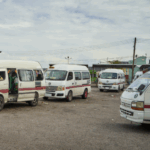Barbados needs about $7 billion in investments to adapt to climate change while simultaneously mitigating against it.
This is outlined in the 2025 Second Nationally Determined Contribution (NDC) submitted to the United Nations Framework Convention on Climate Change (UNFCCC) on August 30 in fulfilment of the country’s obligations under the Paris Agreement On Climate Change.
Barbados signed and ratified the Paris Agreement on April 22, 2016, which entered into force on November 4 that year.
This latest NDC covers 2025 to 2035 and in it Government has committed to the “bold and courageous” goal of reducing carbon emissions of 45 per cent below the 2008 level by 2035.
It will require mitigation measures totalling $4.8 million, and adaptation and resilience investments of $2.2 million over a ten-year period ending in 2035, the NDC stated.
‘Powerful signal’ UNFCCC executive secretary Simon Stiell called the document “a powerful signal for the region and for small island developing states across the globe”.
The $4.8 billion in mitigation investments Government has detailed as part of the NDC Investment Plan are $4 billion in the energy sector, $370 million in the transport sector, $250 million in several “cross-cutting” sectors that were not specified, $100 million in the agriculture, forestry and other land use sector, and $60 million in the waste sector.
“Barbados will be able to mobilise about 65 per cent of the required mitigation investments unilaterally. The remaining share is subject to accessing international climate finance,” the NDC document stated.
“The large share of unconditional finance represents a significant enhancement of the 2025 NDC, when compared to 2021.”
The NDC Investment Plan also includes about $2.2 billion adaptation and resilience measures comprising investments of $960 million in the water sector, $400 million for coastal zones, $300 million in the blue economy sector, $200 million in the housing sector, $100 million in the sustainable tourism sector, $80 million in the transport sector, $80 million in agriculture, forestry and other land uses, and $60 million in the health sector.
Concessional finance
“Barbados will be able to mobilise about $300 million of the required adaptation investments unilaterally. The remaining interventions require access to concessional, international climate finance,” the NDC noted.
Government said in its submission to the UNFCCC that since 2021, Barbados has been acting in partnership to deliver on its updated NDC commitments.
“Firstly, in 2023, the Government of Barbados decided to use US$10 million from the fiscal space created by the Resilience and Sustainability Facility
(RSF) with the International Monetary Fund as capital for a new Blue Green Bank,” it said.
“This capital will support five times that lending amount. The Green Climate Fund (GCF) is a cofounding partner in the bank. This paved the way for others, including CAF and Inter-American Development Bank, to support the Blue Green Bank through technical support or capitalisation.
“The Blue Green Bank will help finance over [$500 million] of green investments in affordable homes, hurricane-resilient roofs, the electrification of public and private transport, and other NDC-aligned investments.”
It also said that “secondly, low-cost and longterm financing instruments from the European Investment Bank, CAF, IDB, GCF and RSF will support Government investment in resilient water and waste treatment infrastructure, flood and coastal protection, and support its efforts to transform state-owned enterprises and enfranchise workers”.
Outside of this financial support, Barbados’ Second NDC has asserted that “to enable developing country NDCs to achieve conditional contributions, a step change in affordable climate finance is needed.
“Increased NDC mitigation ambition to achieve a Paris Agreement-aligned 1.5 degrees pathway, depends on increased finance commitments. The commitments made at UNFCCC COP 29 fall far short of these finance needs,” it said.
“Barbados is making concrete proposals in an attempt to close the financing gap. Barbados has a significantly reduced fiscal space, reflected in a high debt-to-GDP ratio, exacerbated by the pandemic. This significantly constrains Barbados’ ability to borrow.”
The submission added: “While Barbados continues to seek to attract finance, including blended finance, the cost of capital for climate investment projects remains high. Barbados is, therefore, actively identifying opportunities to access grant financing for specific climate change activities.
“To open up the fiscal space, innovative financial instruments and clauses, such as the natural disaster clause currently included in Barbados’ debt instruments, are needed to tackle climate change. This provides more certainty to investor and debtor in uncertain times.”
Government also called for a significant “scale-up” of existing catastrophe-triggered financial instruments, while developing innovative instruments that incentivise resilience building.
“The new instruments should address the debt burden of vulnerable developing countries. Barbados wishes to reduce its reliance on foreign exchange for investment in the transformation to a low-carbon economy,” it said in the NDC report.
“However, a high cost of local capital continues to constrain the feasibility of renewable energy investments.” (SC)
The post $7b for climate change appeared first on nationnews.com.


